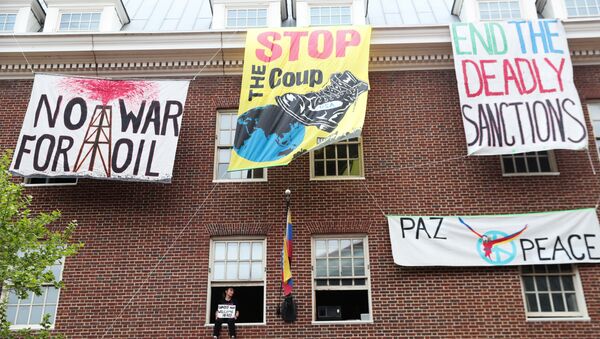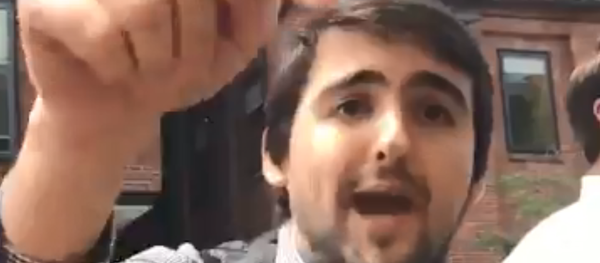Members of the Embassy Protection Collective who were arrested by armed US police inside the Venezuelan Embassy in Washington, DC have been released, pending a hearing on various conditions.
The four protesters — Kevin Zeese, Margaret Ann Flowers, Adrienne Pine, and David Vernon Paul — could face up to a year in jail for reportedly trying to prevent the takeover of the building by the US-backed opposition.
The misdemeanour charge of “interfering with a federal law enforcement agent engaged in protective functions” carries a maximum sentence of one year in jail and a $1,000 fine. The activists, however, claim the US police had no legal right to enter the building, reflecting the opinion of the Venezuelan government.
The embassy protectors are free pic.twitter.com/CRsYLYjmqs
— Alex Rubinstein (@RealAlexRubi) May 17, 2019
Kevin Zeese told journalist Anya Parampil after his release that the activists were looking forward to the trial, and planned to “make the case that there is a legitimate government, that the Vienna convention was violated, that this was an inappropriate and unlawful arrest.”
After departing the courthouse, Zeese told reporters he was confident they would be "found not guilty in the end".
WATCH members of the Embassy Protection Collective speak following their release from jail: https://t.co/rDJ59CsoLn
— Anya Parampil (@anyaparampil) May 17, 2019
As a condition of their release, the activists have been ordered by the judge to steer clear of 10 locations currently controlled by representatives of the Venezuelan opposition and to check in weekly with authorities.
The four are due back in court on 12 June.
For 36 days, a collective of anti-war activists from groups including Code Pink, Act Now to Stop War and End Racism (ANSWER), Popular Resistance and the Black Alliance for Peace had been residing in the Venezuelan Embassy in Washington, DC's Georgetown district, with the express permission of the Venezuelan foreign ministry.
The activists sought to prevent it from being seized by those representing the US-backed “self-proclaimed president” Juan Guaido, whose operatives have taken possession of other Venezuelan diplomatic buildings after the last Venezuelan diplomats departed the country in late April, when their visas expired.
READ MORE: Venezuela Willing to Begin Dialogue With US on Basis of Mutual Respect, FM Says
Pro-Guaido protesters were allowed by US police to lay siege to the embassy building, blocking all entry and supplies, according to Code Pink's Medea Benjamin, while another activist, reporter Mark Hand, accused the municipal water company DC Water of leaving the activists without water, and public utility Pepco for the continued blackout.
The activists maintain that, as per the Vienna Convention of 1961, the legal owner of the embassy building is the Venezuelan government in Caracas.
Venezuelan Vice Minister for North American Relations Carlos Ron condemned the US police raid on the embassy, calling it an “unlawful breach of the Vienna Convention” and confirming that the Venezuelan government did not authorise any US authorities to enter the building, which under international law is considered Venezuelan diplomatic property.
However, since 23 January, US officials have recognised Juan Guaido as the country's president and have been citing Carlos Vecchio, Guaido's "ambassador" to Washington, who has claimed the embassy on behalf of Guaido's government.
READ MORE: Members of Venezuelan Military Say Waiting for US With Weapons in Their Hands
Juan Guaido’s three attempts to stage coups d'etat, however, have all fallen through.
Venezuela’s President Nicholas Maduro has said his government had defeated the "small" uprising, which he denounced as a coup attempt, adding the attorney general had designated three special prosecutors to investigate the uprising and interrogate those involved.




